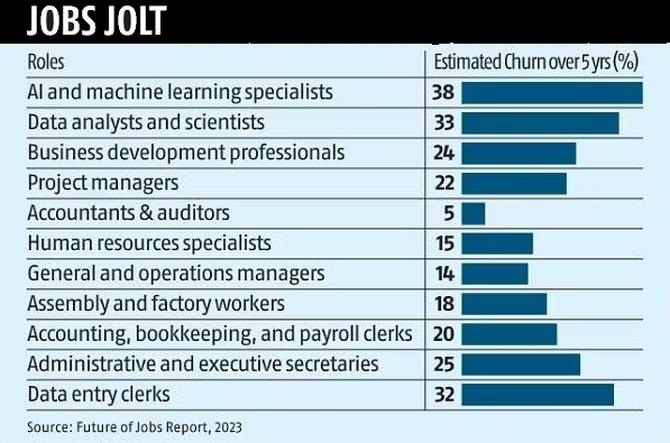India to Witness Less Job Churn In Next 5 Years
Artificial intelligence and machine learning will account for 38% of churn in Indian labour markets, followed by data analysts and scientists (33%), and data entry clerks (32%). Labor-intensive industries, on the other hand, such as accountants and auditors (5%), operations managers (14%), and industrial employees (18%), are predicted to have the least turnover.

India to Witness Less Job Churn In Next 5 Years
According to a recent World Economic Forum analysis, employment churn in India is likely to be lower than the global average over the next five years.
According to the report, Future of employment, which maps employment and skills in the next years and measures the rate of change, the Indian labour market would experience 22 percent job churn, compared to 23 percent globally.
‘Labour-market churn‘ refers to the predicted job movement as a percentage of present employment, including new roles created and old roles eliminated.
This eliminates scenarios in which a new employee replaces an existing employee in the same function.
The worldwide advocacy group’s research includes the perspectives of nearly 800 companies from 27 industry clusters and 45 economies around the world.
Artificial intelligence and machine learning will account for 38% of churn in Indian labour markets, followed by data analysts and scientists (33%), and data entry clerks (32%).
Labor-intensive industries, on the other hand, such as accountants and auditors (5%), operations managers (14%), and industrial employees (18%), are predicted to have the least turnover.
Globally, churn is predicted to be led by the supply chain and transportation industries, as well as the media, entertainment, and sports industries, resulting in the creation of 69 million jobs and the loss of 83 million jobs, for a net decrease of 14 million jobs, or 2% of present employment.
The tasks are no more mechanised than they were three years ago, when the report was issued.
‘Around a third of tasks (34%) are currently automated, which is only 1% more than the 2020 forecast. ‘Surveyed organisations also lowered their forecasts for additional automation down to 42% of tasks by 2027, compared to 2020 estimates of 47% of tasks by 2025,’ it said.

Furthermore, 61% of respondents from Indian firms believe that broader applications of environmental, social, and governance (ESG) standards will drive job growth, followed by increased adoption of new and frontier technologies (59%), expanded digital access (55%), and investment prompted by climate change (53%).
In terms of the impact of technology on job creation, the report notes that 62% of firms believe big-data analytics will have the greatest impact, followed by encryption and cybersecurity (53%), digital platforms and applications (51%), and e-commerce (46%).
According to the report, India is one of seven nations, including Brazil, where social jobs, which are critical to societal well-being and social mobility, have grown at a slower rate than non-social jobs since the epidemic.
When comparing countries’ perspectives on talent availability when hiring, the survey discovers that the most populous countries, such as China and India, are more optimistic than the worldwide average.
In terms of business practises to boost talent availability, 52 percent of organisations believe that enhancing promotion and talent advancement processes is more beneficial than offering effective reskilling and upskilling (36 percent).
According to the report, 97 percent of respondents in India believe that funding by their own organisation is the most successful option for closing the skills gap between workers’ skills and future business demands, while only 18 percent believe that training should be sponsored by the government.
- Union Budget 2026-27 : Yuva Shakti Budget Big Numbers, Slow Payoff - February 4, 2026
- AI in HR: Why ROI Isn’t the Right Question—Yet - September 8, 2025
- The Hidden Cost of Fear in the Workplace: Why Generational Optimism Isn’t Enough - September 2, 2025







